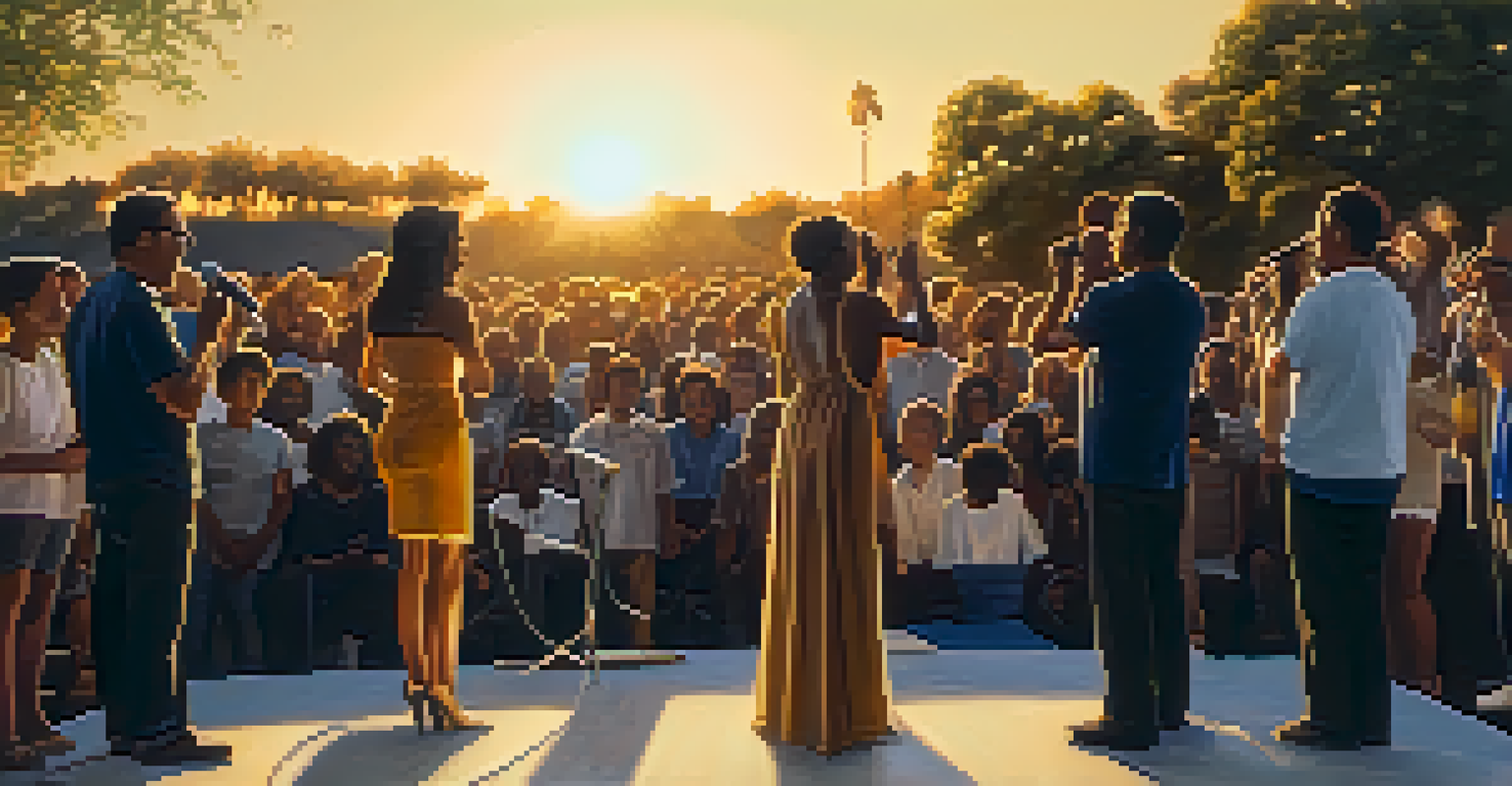The Power of Songwriting in Conflict Resolution Processes

Understanding Conflict Resolution Through Creative Expression
Conflict resolution often requires a delicate touch, and creative expression can serve as an effective tool in this process. By allowing individuals to articulate their feelings through songwriting, they can address underlying emotions that might be difficult to express verbally. This artistic outlet paves the way for deeper understanding and empathy among conflicting parties.
Music can change the world because it can change people.
When people write songs, they often explore their personal narratives, which can highlight differing perspectives in a conflict. This exploration not only fosters self-reflection but also encourages others to listen more openly. In essence, songwriting becomes a bridge that connects disparate viewpoints, making resolution more achievable.
Additionally, the collaborative nature of songwriting can further enhance conflict resolution efforts. When individuals come together to create music, they must communicate, negotiate, and compromise, all of which are essential skills in resolving disputes. This shared experience can create bonds that help dissolve animosities.
The Emotional Healing Power of Music in Conflicts
Music has an inherent ability to evoke emotions, and songwriting is no different. When individuals channel their feelings into lyrics, it provides a cathartic release that can alleviate stress and tension associated with conflict. This emotional healing can be a significant step toward reconciliation.

For instance, a songwriter might express feelings of anger or sadness in their lyrics, which can lead to a sense of validation and understanding. This process can help individuals feel heard and appreciated, reducing feelings of isolation that often accompany conflicts. Ultimately, this emotional connection can foster a more compassionate atmosphere.
Songwriting Enhances Conflict Resolution
Creative expression through songwriting helps individuals articulate their emotions, fostering understanding and empathy in conflicts.
Moreover, music can serve as a powerful reminder of shared experiences and humanity. When individuals listen to songs that resonate with their struggles, it can create a sense of belonging and solidarity. This shared emotional journey can ease tensions and lay the groundwork for resolution.
Building Bridges: Songwriting as a Communication Tool
Effective communication is vital in conflict resolution, and songwriting can facilitate this in unique ways. Through music, individuals can express complex emotions and thoughts that might be hard to articulate in conversation. Lyrics often convey feelings more powerfully than spoken words alone, allowing for greater clarity.
Songwriting is a way of finding out who you are and what you feel.
Additionally, songs can serve as conversation starters, prompting discussions about feelings and experiences. For example, a group might write a song that addresses their collective challenges, opening the floor for dialogue about their differing perspectives. This collaborative effort can break down barriers and encourage openness.
Furthermore, the rhythmic and lyrical aspects of songwriting can capture attention and foster engagement. When people listen to a song, they often find themselves more receptive to its message. This receptivity can lead to more constructive conversations, ultimately aiding the conflict resolution process.
Transforming Conflict Through Collaborative Songwriting
Collaborative songwriting involves multiple parties working together to create a piece of music. This process can transform individual grievances into a unified expression, promoting teamwork and cooperation. When participants invest in creating a song, they develop a shared ownership of the outcome, which can enhance relationships.
As they collaborate, individuals are encouraged to listen to each other's ideas, fostering a sense of respect and understanding. This mutual respect is crucial for resolving conflicts, as it allows each party to feel valued. The resulting song can serve as a testament to their journey toward resolution.
Music Provides Emotional Healing
Channeling feelings into lyrics offers a cathartic release, promoting emotional healing and reducing isolation during conflicts.
Moreover, the energy and creativity involved in songwriting can shift the focus from the conflict itself to the collaborative process. This shift can lighten the emotional load associated with the dispute, making it easier for individuals to engage constructively. Ultimately, creating music together can transform adversaries into allies.
Using Lyrics to Reflect and Reframe Perspectives
Song lyrics often serve as a mirror, reflecting the thoughts and feelings of the songwriter. By writing about their experiences, individuals can gain insights into their own emotions and reactions during conflicts. This reflective process is essential for understanding the root causes of disagreements.
Additionally, songwriting can help reframe perspectives, allowing individuals to see conflicts in a new light. For example, a songwriter might shift from expressing blame to acknowledging their role in the situation. This reframing promotes personal growth and can lead to more constructive conflict resolution.
Furthermore, lyrics can be shared with others, fostering an environment of vulnerability and openness. When individuals share their songs, it invites others to empathize and engage with their emotions. This shared experience can facilitate deeper understanding and pave the way for resolution.
The Role of Performance in Conflict Resolution
Performing a song can be a powerful way to convey emotions and messages. When individuals share their songs in front of others, it provides an opportunity to communicate feelings that may have been difficult to express otherwise. This act of sharing can foster empathy and understanding among conflicting parties.
Moreover, the performance aspect allows for an emotional release that can be cathartic for both the performer and the audience. As individuals express their feelings through music, it can create a shared emotional experience that resonates deeply. This connection can help break down barriers and facilitate resolution.
Collaboration Builds Respect and Unity
Collaborative songwriting encourages communication and mutual respect, transforming adversaries into allies in the resolution process.
Additionally, performances can serve as a platform for dialogue, encouraging discussions about the themes and emotions expressed in the song. This dialogue can lead to greater insight into each other's perspectives, ultimately aiding the conflict resolution process.
Case Studies: Successful Songwriting in Conflict Resolution
Many communities have harnessed the power of songwriting to resolve conflicts. For example, programs that facilitate songwriting workshops often bring together individuals from opposing sides to collaborate on music projects. These workshops have shown promising results in reducing tensions and fostering understanding.
In one notable case, a group of young people from different backgrounds came together to write and perform a song about their shared experiences. This collaboration not only helped them connect on a personal level, but it also sparked conversations about the issues they faced in their community. The song became a tool for advocacy and change.

These success stories illustrate the potential of songwriting as a conflict resolution tool. By creating a space for collaboration, expression, and dialogue, communities can thrive and heal through the power of music.